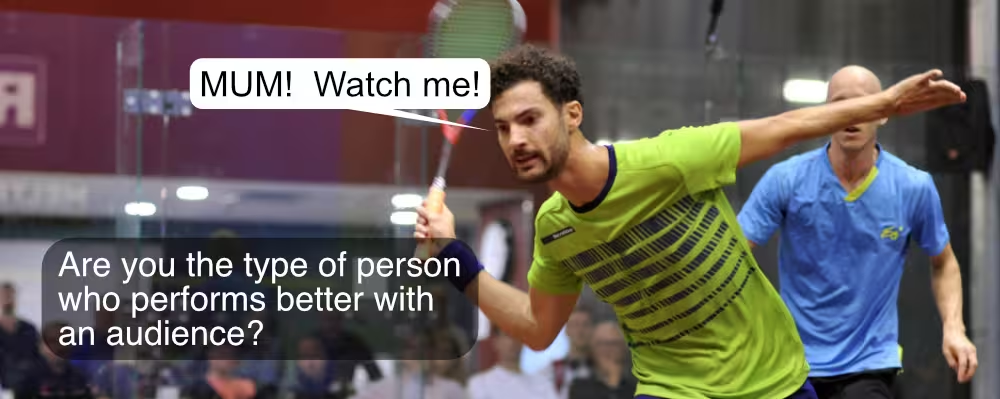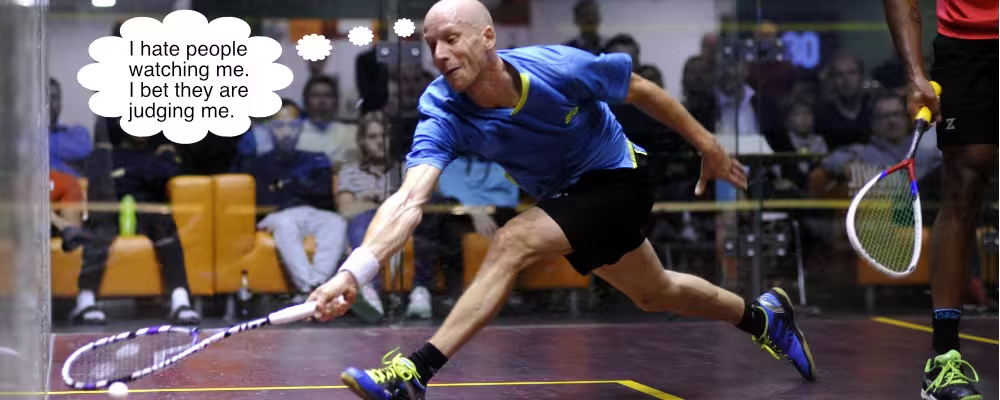05 February 2024 / 4-Min Read / Translate
A long time ago, I wrote a short article about how my presence behind a back wall had turned a friendly knockabout into a competitive and serious game. I can’t find the article any more, so perhaps it got lost in the server move a few years ago.
I’ll start by repeating it now. I had just finished using the steam room in my local sports centre and as I was exiting the building, I heard the squash court being used. This is pretty unusual and being a curious person, I decided to have a look. I edged up to the door and twisted my neck around the corner, purposefully avoiding being seen through the glass back wall.
There were two players, both known to me, who were playing some rallies with little concentration or intent. I watched for a couple of minutes and then walked around the corner to be able to watch more comfortably.
It was at this point I was seen. Both players waved to me and I waved back. From that moment onwards things turned serious. They both started to play classical squash, i.e. straight drives up and down the walls, hunting for volleys and more aggressive drop shots.

Before you suggest that I just happened to see the start of the proper match, you would be wrong, because they were halfway through the second game.
The event reminded me of times when I was watched by my coach and how I had made an extra special effort to play my best squash.
So why am I telling you this? Well, a recent post on the Squash subreddit reminded me of this incident and it is entitled Turns out I'm a whore, which sounds a lot worse from the title than it actually is.
In British English, we use the phrase “attention whore” to describe a person who likes and probably cultivates being watched and wants to be the centre of attention. The post simply related the situation where the player played much better squash when they were being watched - the same as my example above.
In this particular case, I felt the poster was attributing a negative connotation to the whole experience and it doesn’t have to be that way. For many people, they really do play or perform better when other people are watching.
It seems that when people know somebody is watching them perform an action, a part of the brain associated with Social Cognition gets activated as well as another part of the cortex connected with reward. Together these signals triggered activity in the ventral striatum, an area of the brain that motivates action and motor skills. For those interested, there is a Wikipedia page that covers Social Facilitation.
You only need to spend time around children to see most of them shout to their parents “Mum/dad!” MUM/DAD! Watch me”. It’s clearly something that we are born with or at least develop as children.
I’m not a qualified sports psychologist, but it’s clear to me that for some people, having somebody they respect or are close to does have a positive effect on their performance. The question of the type of audience and how big that audience is, really needs more research.

For example, get a huge group of non-squash-playing and very bored teenagers watching club players and I would imagine that it would be a horrible experience for all concerned. Now get a smaller group of fellow squash players watching the match and things would be different.
It’s clear that both “how” the players respond to the audience AND the atmosphere generated by the audience will affect the performance of the players depending on those performers. PHEW! So many variables.
Well, if you are the type of person who does perform better with an audience, then try to imagine people watching when there aren’t any. Yes, I know that’s not ideal, but it’s not much different from players who try to artificially generate anger to increase their arousal.
Perhaps it’s just a case of trying it a few times and seeing if it helps. As I am sure I said in the article I wrote before, if it helps, imagine me standing behind the back wall or on the balcony looking down on you with a poker face expression. Better yet, imagine your favourite player watching you.
If you do perform better when other people are watching you, don’t see it as a negative thing. Any mindset stratagem that helps you is worth seriously considering, no matter how strange or unusual it may seem.
The difference between an imagined or real audience is all in the mind anyway.